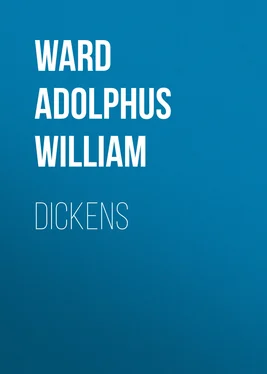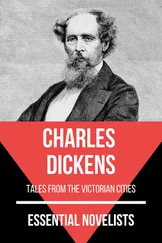Adolphus Ward - Dickens
Здесь есть возможность читать онлайн «Adolphus Ward - Dickens» — ознакомительный отрывок электронной книги совершенно бесплатно, а после прочтения отрывка купить полную версию. В некоторых случаях можно слушать аудио, скачать через торрент в формате fb2 и присутствует краткое содержание. Жанр: Биографии и Мемуары, foreign_antique, на английском языке. Описание произведения, (предисловие) а так же отзывы посетителей доступны на портале библиотеки ЛибКат.
- Название:Dickens
- Автор:
- Жанр:
- Год:неизвестен
- ISBN:нет данных
- Рейтинг книги:5 / 5. Голосов: 1
-
Избранное:Добавить в избранное
- Отзывы:
-
Ваша оценка:
- 100
- 1
- 2
- 3
- 4
- 5
Dickens: краткое содержание, описание и аннотация
Предлагаем к чтению аннотацию, описание, краткое содержание или предисловие (зависит от того, что написал сам автор книги «Dickens»). Если вы не нашли необходимую информацию о книге — напишите в комментариях, мы постараемся отыскать её.
Dickens — читать онлайн ознакомительный отрывок
Ниже представлен текст книги, разбитый по страницам. Система сохранения места последней прочитанной страницы, позволяет с удобством читать онлайн бесплатно книгу «Dickens», без необходимости каждый раз заново искать на чём Вы остановились. Поставьте закладку, и сможете в любой момент перейти на страницу, на которой закончили чтение.
Интервал:
Закладка:
Before the next theatrical season opened he had at last—in the year 1831—obtained employment as a parliamentary reporter, and after some earlier engagements he became, in 1834, one of the reporting staff of the famous Whig Morning Chronicle , then in its best days under the editorship of Mr. John Black. Now, for the first time in his life, he had an opportunity of putting forth the energy that was in him. He shrunk from none of the difficulties which in those days attended the exercise of his craft. They were thus depicted by himself, when a few years before his death he “held a brief for his brothers” at the dinner of the Newspaper Press Fund: “I have often transcribed for the printer from my short-hand notes important public speeches in which the strictest accuracy was required, and a mistake in which would have been to a young man severely compromising; writing on the palm of my hand, by the light of a dark lantern, in a post-chaise and four, galloping through a wild country, and through the dead of the night, at the then surprising rate of fifteen miles an hour.... I have worn my knees by writing on them on the old back row of the old gallery of the old House of Commons; and I have worn my feet by standing to write in a preposterous pen in the old House of Lords, where we used to be huddled together like so many sheep kept in waiting, say, until the woolsack might want restuffing. Returning home from excited political meetings in the country to the waiting press in London, I do verily believe I have been upset in almost every description of vehicle known in this country. I have been in my time belated on miry by-roads, towards the small hours, forty or fifty miles from London, in a wheelless carriage, with exhausted horses and drunken post-boys, and have got back in time for publication, to be received with never-forgotten compliments by the late Mr. Black, coming in the broadest of Scotch from the broadest of hearts I ever knew.” Thus early had Dickens learnt the secret of throwing himself into any pursuit once taken up by him, and of half achieving his task by the very heartiness with which he set about it. When at the close of the parliamentary session of the year 1836 his labours as a reporter came to an end, he was held to have no equal in the gallery. During this period his naturally keen powers of observation must have been sharpened and strengthened, and that quickness of decision acquired which constitutes, perhaps, the most valuable lesson that journalistic practice of any kind can teach to a young man of letters. To Dickens’s experience as a reporter may likewise be traced no small part of his political creed, in which there was a good deal of infidelity; or, at all events, his determined contempt for the parliamentary style proper, whether in the mouth of “Thisman” or of “Thatman,” and his rooted dislike of the “cheap-jacks” and “national dustmen” whom he discerned among our orators and legislators. There is probably no very great number of Members of Parliament who are heroes to those who wait attendance on their words. Moreover, the period of Dickens’s most active labours as a reporter was one that succeeded a time of great political excitement; and when men wish thankfully to rest after deeds, words are in season.
Meanwhile, very tentatively and with a very imperfect consciousness of the significance for himself of his first steps on a slippery path, Dickens had begun the real career of his life. It has been seen how he had been a writer as a “baby,” as a school-boy, and as a lawyer’s clerk, and the time had come when, like all writers, he wished to see himself in print. In December, 1833, the Monthly Magazine published a paper which he had dropped into its letter-box, and with eyes “dimmed with joy and pride” the young author beheld his first-born in print. The paper, called A Dinner at Poplar Walk , was afterwards reprinted in the Sketches by Boz under the title of Mr. Minns and his Cousin , and is laughable enough. His success emboldened him to send further papers of a similar character to the same magazine, which published ten contributions of his by February, 1835. That which appeared in August, 1834, was the first signed “Boz,” a nickname given by him in his boyhood to a favourite brother. Since Dickens used this signature not only as the author of the Sketches and a few other minor productions, but also as “editor” of the Pickwick Papers , it is not surprising that, especially among his admirers on the Continent and in America, the name should have clung to him so tenaciously. It was on a steamboat near Niagara that he heard from his state-room a gentleman complaining to his wife: “Boz keeps himself very close.”
But the Monthly Magazine , though warmly welcoming its young contributor’s lively sketches, could not afford to pay for them. He was therefore glad to conclude an arrangement with Mr. George Hogarth, the conductor of the Evening Chronicle , a paper in connexion with the great morning journal on the reporting staff of which he was engaged. He had gratuitously contributed a sketch to the evening paper as a personal favour to Mr. Hogarth, and the latter readily proposed to the proprietors of the Morning Chronicle that Dickens should be duly remunerated for this addition to his regular labours. With a salary of seven instead of, as heretofore, five guineas a week, and settled in chambers in Furnival’s Inn—one of those old legal inns which he loved so well—he might already in this year, 1835, consider himself on the high-road to prosperity. By the beginning of 1836 the Sketches by Boz printed in the Evening Chronicle were already numerous enough, and their success was sufficiently established to allow of his arranging for their republication. They appeared in two volumes, with etchings by Cruikshank, and the sum of a hundred and fifty pounds was paid to him for the copyright. The stepping-stones had been found and passed, and on the last day of March, which saw the publication of the first number of the Pickwick Papers , he stood in the field of fame and fortune. Three days afterwards Dickens married Catherine Hogarth, the eldest daughter of the friend who had so efficiently aided him in his early literary ventures. Mr. George Hogarth’s name thus links together the names of two masters of English fiction; for Lockhart speaks of him when a writer to the signet in Edinburgh as one of the intimate friends of Scott. Dickens’s apprenticeship as an author was over almost as soon as it was begun; and he had found the way short from obscurity to the dazzling light of popularity. As for the Sketches by Boz , their author soon repurchased the copyright for more than thirteen times the sum which had been paid to him for it.
In their collected form these Sketches modestly described themselves as “illustrative of every-day life and every-day people.” Herein they only prefigured the more famous creations of their writer, whose genius was never so happy as when lighting up, now the humorous, now what he chose to term the romantic, side of familiar things. The curious will find little difficulty in tracing in these outlines, often rough and at times coarse, the groundwork of more than one finished picture of later date. Not a few of the most peculiar features of Dickens’s humour are already here, together with not a little of his most characteristic pathos. It is true that in these early Sketches the latter is at times strained, but its power is occasionally beyond denial, as, for instance, in the brief narrative of the death of the hospital patient. On the other hand, the humour—more especially that of the Tales —is not of the most refined sort, and often degenerates in the direction of boisterous farce. The style, too, though in general devoid of the pretentiousness which is the bane of “light” journalistic writing, has a taint of vulgarity about it, very pardonable under the circumstances, but generally absent from Dickens’s later works. Weak puns are not unfrequent; and the diction but rarely reaches that exquisite felicity of comic phrase in which Pickwick and its successors excel. For the rest, Dickens’s favourite passions and favourite aversions alike reflect themselves here in small. In the description of the election for beadle he ridicules the tricks and the manners of political party-life, and his love of things theatrical has its full freshness upon it—however he may pretend at Astley’s that his “histrionic taste is gone,” and that it is the audience which chiefly delights him. But of course the gift which these Sketches pre-eminently revealed in their author was a descriptive power that seemed to lose sight of nothing characteristic in the object described, and of nothing humorous in an association suggested by it. Whether his theme was street or river, a Christmas dinner or the extensive groves of the illustrious dead (the old clothes shops in Monmouth Street), he reproduced it in all its shades and colours, and under a hundred aspects, fanciful as well as real. How inimitable, for instance, is the sketch of “the last cab-driver, and the first omnibus cad,” whose earlier vehicle, the omnipresent “red cab,” was not the gondola, but the very fire-ship of the London streets.
Читать дальшеИнтервал:
Закладка:
Похожие книги на «Dickens»
Представляем Вашему вниманию похожие книги на «Dickens» списком для выбора. Мы отобрали схожую по названию и смыслу литературу в надежде предоставить читателям больше вариантов отыскать новые, интересные, ещё непрочитанные произведения.
Обсуждение, отзывы о книге «Dickens» и просто собственные мнения читателей. Оставьте ваши комментарии, напишите, что Вы думаете о произведении, его смысле или главных героях. Укажите что конкретно понравилось, а что нет, и почему Вы так считаете.












